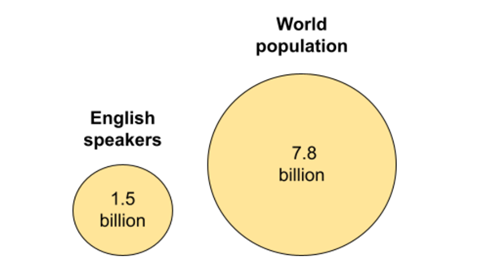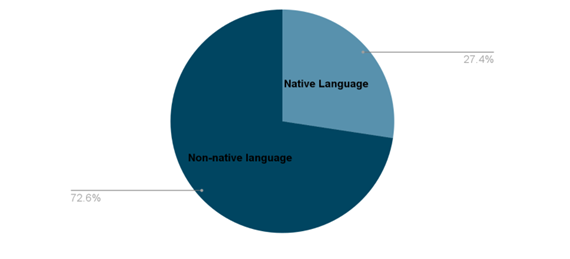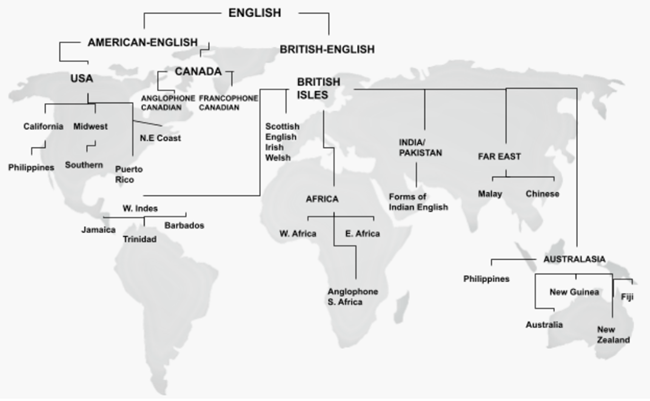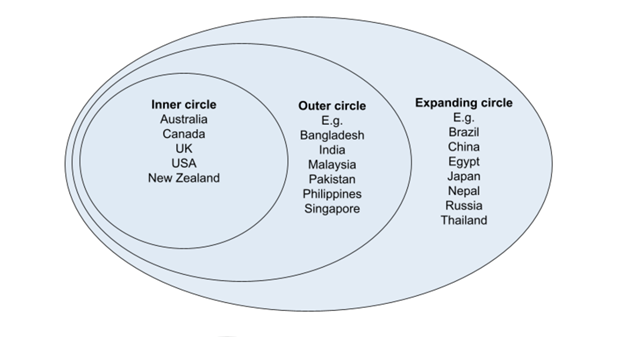What is International English?
The term 'International English' can be used to refer to this variety (or 'form') spoken by non-native English speakers. International English is based on the British Standard, which is taught in schools.
It can be seen as:
Neutral because it is not tied to a particular culture or values and it is the variety that is spoken worldwide (Wardhaugh 1987). Learners do not learn a specific accent or dialect when learning International English.
Flexible because it can be used by many different people and adapted according to language needs. It is also studied and used as the world's 'lingua franca' (common language) and is generally understood by all English speakers, which is not the case with regional varieties.
You may also hear the terms 'Global English', 'World English', and 'Common English', all referring to the English that is spoken around the world. The term 'English as a lingua franca (ELF)' refers to the use of English between non-native speakers who use English to communicate with each other, regardless of background.
English speaking countries
Nowadays, people speak English everywhere; or so it seems. But how many people in the world actually speak English?
Let's take a look at the key figures:

Fig. 1 - Out of the whole population of the world, English speakers make up a considerable chunk!
Out of the 7.8 billion people living on the planet, 1.5 billion people speak English to a conversational level.
How many people speak English as a first language?

Fig. 2 - There are more people who speak English as a non-native language than their are native language speakers in the world.
The history of the English language
The English language has evolved over many centuries, influenced by contact with various events and groups of people. Let's take a look at some key dates: 
Fig. 3 - Here's a visual timeline of the history of English.
The standardisation of the English language
In the past, English existed in many different forms - people all over the country spoke in different ways and used different words. It wasn't until the introduction of the printing press in 1476 that English began to look more like the English we use today. But how did this affect the English language? Well, since there were many different forms of English, people needed to agree on a common form to use in books, magazines, and newspapers. The standard chosen was a London dialect that was used in the Chancery (an office that prepared court documents), and this was the start of the standardisation of English!
The process of standardisation changed the English language, as the London dialect was gradually accepted as the common language for printing. The idea began to emerge that what was seen in books and official documents was a 'correct' and 'pure' way to speak. This 'correct' form is otherwise known as the 'Standard'.
Prescriptivism vs. descriptivism
This process of standardisation changed the English language, as the London dialect was gradually accepted as the common language for printing. The idea began to emerge that what was seen in books and official documents was a 'correct' and 'pure' way to speak. This 'correct' form is otherwise known as the 'Standard'.
The belief that a certain form of English is 'correct' is called prescriptivism.
Prescriptivists look at how language should be used.
They believe that language should follow specific rules.
This 'correct' form of language is seen as superior to all other variants, as it suggests that other forms of language are 'incorrect'.
This idea persists today, especially in education (throwback to all of the spelling tests and grammar corrections in school!). These standards are also enforced through 'official' institutions and resources, such as the Oxford English Dictionary.
The opposite of this view is called descriptivism.
Varieties of English
A variety is a specific form of language, for example, people from certain regions use certain varieties such as a Manchester variety or a Leeds variety. Standard English is also a variety, as well as dialects from around the world such as Canadian English and Indian English.
English varieties have numerous features that define them. These features include:
Accents (the ways in which people pronounce words e.g. David Beckham and the Beatles have Scouse accents).
Dialects (the particular words that people use in a specific region or group e.g. Cockney is a dialect in which they use rhymes such as 'the apples and pears' meaning 'stairs').
Slang (newly coined words and phrases e.g. 'that's dope' meaning 'that's great').
Register (a variety of languages used in a particular situation. This may be influenced by field (topic), manner (formality), or mode (written or spoken)).
Style (the way we express ourselves to our audience).
Social interaction
English is seen as a flexible and adaptable language and it is used by people from all over the world in many different settings. It is, therefore, a great tool for social interaction between people from different countries.
The internet is a major form of social interaction nowadays. Many of us cannot go a day without it! With billions of people worldwide using the internet for communication, a common language for interaction is essential. For this reason, English has risen as the language of the internet with the majority of users using the language online.
The rise of International English
So, how exactly did English become an International language in the modern world? Simply put, it is all a question of power.
English in science and technology
The influence of Modern English can be seen for centuries, starting with the growing power of the British Empire in the 16th century. By the 19th century, the Empire was HUGE and many new words and expressions were adopted from countries around the world (eg the word 'pyjamas' coming from India). This was also the time of the industrial revolution, in which many new technologies were introduced. New words were therefore needed to describe these new technologies, such as the steam engine and the spinning wheel.
Nowadays, most activities in science and technology around the world are still carried out in English. This is why scholars such as Drubin and Kellogg (2012) have named English the language of science and technology.
English in the economy
In more recent times, academics have been studying the links between the English proficiency of a population and the economic growth of the country, a field of study called the 'economics of language'. Some academics see English as a 'must have' for participation in the global economy, and a tool for socio-economic development 'and mobility (Brooker, 2018).
A variant of International English called 'Business English' is also taught and learned worldwide in order to aid communication between non-native speakers in the business world. It focuses on certain expectations of clarity, specific vocabulary, and specific grammar used within business interactions (Spencer, KA 2021).
English in popular culture
As big American corporations grew throughout the 20th century, so did the influence of American culture. Think Hollywood, Broadway, fast food, pop songs, and huge shopping malls. Brits also had an impact with bands such as The Beatles and The Rolling Stones. These anglophone influences in popular culture means that songs, films, and products are distributed all around the world in the English language.
World English: English Language
With the influence of English around the world, parts of the language are being adopted into other languages. This can create a blend, or 'hybrid', of the two languages.
For example, Hinglish is a hybrid of Hindi and English. Speakers of Hinglish will use English words and phrases within a Hindi conversation, creating a blend of the two. For example, a Pepsi campaign called 'Ask for more!' used a Hinglish version of the slogan 'Yeh Dil Maange More!' meaning 'The heart wants more!' (Gardner 2009). Hinglish is often seen as practical as it can be used between people who speak different Indian languages and the common language of English.
Other examples include Singlish (Singapore languages and English) and West African Pidgin (West African languages and English). Such hybrid languages allow people to express themselves using International English whilst also maintaining their identity in the native language.
What is Pidgin English?
A pidgin is a language that contains features from two or more languages and is generally simplified in terms of grammar and vocabulary. Pidgin English is therefore a simplified mix of English and another local language.
Pidgin English was originally a language used for commerce and trade during the 17th and 18th centuries, including during the Atlantic slave trade. It was used as a lingua franca between traders along the coast who didn't share a common language.
What is dialect levelling?
Dialect levelling is the reduction or elimination of differences/variations between dialects. In other words, the most unique features of people's language are reduced and people speak in a more similar way.
Dialect levelling occurs when multiple different cultures mix, often due to migration, social mobility, and other forms of interaction.
It also occurs frequently in places that have experienced industrialisation and modernisation as many people will move to cities to work. This means that people moving to the city have to adjust their language to be understood by others.
It's important to remember that these changes don't just happen in a day - they occur over a long period of time and often span several generations.
What is technological determinism?
Technological determinism is another key term in International English. This theory assumes that a society is determined by the technology they use. This technology is thought to affect social structures and cultural values, i.e. how a society thinks, feels, and acts.
An example of this is the introduction of mobile phones into society. This revolutionized communication, allowing us to interact across the world. However, it also impacted our language use.
There were limitations, however. The limited keypad made typing out a sentence a long and laborious process. If you wish to type out the letter 'S', you would have to press the '7' key four times! (How did people have the patience?). Unlimited texting also didn't exist at the time so text messages were pretty expensive. People, therefore, had to get creative in order to express their thoughts in as few characters as possible. Words such as 'you' and 'too' were abbreviated to 'u' and '2' whilst phrases like 'laugh out loud' were shortened to acronyms such as 'LOL'. This language is called 'Text Talk', you may also hear 'text speak' and 'SMS language'.
Text speak is still prominent online today, including in apps such as Twitter which still have word limits on posts. Mobile phones are therefore an example of how technology has shaped our society and language.
English language worldwide
Since English is so widely spoken today, it can be hard to comprehend the structures of this expansion. Due to this, theorists have come up with different ways of grouping English from around the world.
Strevens' model of English
Strevens' model of English from 1980 shows how varieties of English can be grouped hierarchically. Each form of English derives from either British or American English, with American English comprising the USA, Canada, the West Indies and the Philippines and British English comprising all other English speaking countries in Europe, Africa, Asia, and Australasia.
Take a look at his model in the diagram below:

Fig. 4 - Strevens Model of English.
Kachru's three concentric circles model
Another way of looking at the expansion of the English language is Braj Kachru's three concentric circles of English.

Fig. 5 - Kachru's Three Concentric Circles Model.
The Inner Circle shows where English is the primary language and the most dominantly used. In these countries, most people are native speakers of English. These countries are therefore considered to provide the 'norms' and traditions for the English language ('norm providing').
The Outer Circle shows countries that have their own native language but English is still an important language for communication eg as a second language or a language of business or institutions. These countries reproduce the norms set by the inner circle and develop these norms further ('norm developing').
The Expanding Circle shows the rest of the countries in the world. These countries have their own native languages and English does not hold any importance on an official level. These countries depend on the inner and outer circles to provide the norms for the English language ('norm dependent').
Political implications of International English
The global expansion of English and the power of the English language have faced criticism. Linguist Robert Phillipson argued that this dominance is an example of linguistic imperialism. This means that the imposition of English maintains inequalities between countries as it also imposes norms and values (similar to the idea of 'norms' in Kachru's model).
The idea of linguistic imperialism has had other negative impacts on languages, for example some theorists believe that English is a 'killer language' and that it is responsible for 'language deaths' worldwide (Quevedo 2016). However, this view is rather simplistic and risks generalising. It is important to recognise other factors at play such as natural disasters or political/social/economic disadvantages.
We also see the preservation and revival of many 'dying' or 'endangered' languages. For example, despite it being declared extinct by UNESCO, the Manx language has experienced revival efforts. This includes Manx radio shows, social media channels, and organisations like the Manx Heritage Foundation.
Due to the supposed threat of English to other languages, there have been attempts to stop it in its tracks. Even countries where English isn't an official language are trying to prevent Anglicisms (English words) from entering their own language. This is particularly the case in countries such as France who have organisations to protect the tradition of their language. The Académie Française (the 'French Academy' who are pretty much like the French language Police) call the use of Anglicisms (English words) and 'invasion' (Académie Française 2021) and have recommended alternative French words to use in their place. For example, saying 'Le baladeur' instead of 'le walkman'.
Future of the English language
So what do we see for the future of the English language?
The English language still holds strong as a global language and is continually used in science and business domains as well as in popular culture and on the Internet. Linguist David Crystal highlights the idea that English is now the most spoken language in the world (as a native, second, or foreign language) and 'is recognised by more countries as a desirable lingua franca than any other language' (Crystal 1999).
Due to its widespread use, International English will continue to exist in many different varieties. Crystal predicts that there have been around 60-70 new 'Englishes' created worldwide since the 1960s (ibid.). These are varieties of English such as Indian English and Nigerian English that are used around the world.
Crystal also highlights the struggles in the future of English Language Teaching (ELT) worldwide. He states that the main issue is finding the balance between finding a standard of English understood worldwide and maintaining international diversity / recognising personal identity.
International English - Key takeaways
- International English refers to a variety of English that can be used worldwide as the main language of communication, it is based on the British Standard.
- English is the most widely spoken language in the world and is the language of science and technology, business and the economy, and of popular culture.
- Prescriptivists believe that language should follow specific rules while descriptivists believe that language can take form in many different ways.
- A variety is a specific form of language. Features include different; accents, dialects, slang, registers, and styles.
- English is an important language for social interaction. It is used on the internet and in official organizations.
- Streven's model of English and Kachru's three concentric circles model can be used for looking at the global spread of English.
- There are political implications involved in the global spread of English such as linguistic imperialism, language death, and the use of Anglicisms.
References
- Académie Française, Anglicismes et autres emprunts, 2021
- Algeo, J. The origins and development of the English language, 2013
- Brooker, D., English for Development: A review of research into the role of English as a driver for socio-economic development, 2018
- Crystal, D. 'The future of Englishes', English Today, 1999, 15 (2), 10-20.
- Foyewa, RA, International Journal of English Language and Linguistics Research, 2015, Vol.3, Issue 5, pp.34-41.
- Gardner, H. 'Hinglish - A 'Pukka' Way to Speak', The National. 1999
- Spencer, KA, 'What is Business English?', Instructional Solutions, 2021
- Wardhaugh, R., Languages in Competition: Dominance, diversity and decline, 1987
Similar topics in English
Related topics to International English












